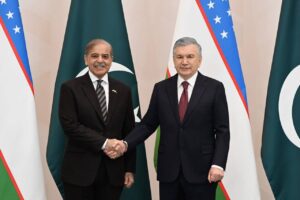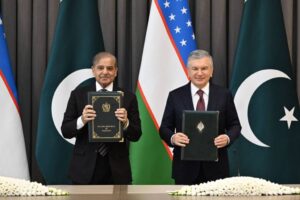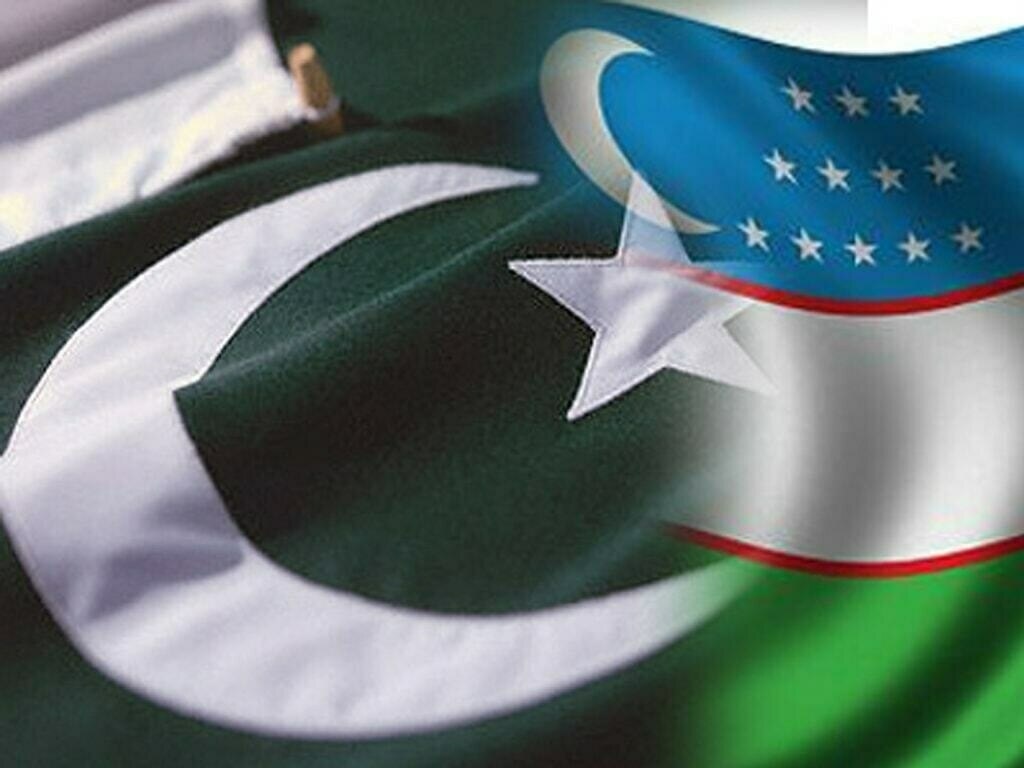
Dr Mehmood Ul Hassan Khan
It seems that horizons of Pakistan-Uzbekistan bilateral relations have now been amplified/expanded and gained immense momentum after the recent official visit of the Prime Minister of Pakistan Mian Muhammad Shehbaz Sharif to Uzbekistan.
Signing of multiple agreements aimed at strengthening bilateral cooperation in defence, technology, technical training, and youth empowerment vividly reflecting emerging strategic partnership covering all aspects of socio-economic integration, industrial cooperation, modernization, technological coordination, youth development and last but not least, security and military cooperation deterring all threats.
Furthermore, setting a target of achieving boosting bilateral trade to US$2b has further strengthened bilateral relations in the diverse sectors of the economy between two countries.
During his visit the Prime Minister of Pakistan Mian Muhammad Shehbaz met with the President of Uzbekistan, Shavkat Mirziyoyev and other high officials calling Uzbekistan as a “reliable partner”. It was a significant visit and milestone for the further strengthening of economic ties, and the expansion of strategic partnerships in key sectors, mainly trade, transport, energy, security and military cooperation. Hopefully signed MOUs in trade, economic cooperation, energy, investments and security would further gear the pace and horizon of the bilateral relations. 
It is a good omen that a productive interdepartmental/inter-ministerial mechanism has also been established in the fields of media, culture, education, business, transport and logistics, law enforcement, the struggle against terrorism and transnational crime, and other areas.
It is suggested that both countries should focus on the creation of joint ventures in sectors such as the textile industry, garments, fashion industry, agriculture, pharmaceuticals, and information technology. Interestingly, now there are 130 joint ventures operating in Uzbekistan with Pakistani capital participation.
Investment projects in partnership with large Pakistani companies such as “Novugen Pharma”, “UP-Match”, “Pak-Merit Bleaching”, “Diamond Group”, and others have been implemented in Syrdarya, Tashkent and Namangan regions, as well as the city of Tashkent.
Hopefully, Prime Minister Shebaz’s recent visit will further strengthen bilateral trade, investments, joint centers and holding of business forums, B2B and G2B meetings, industrial and agricultural exhibitions, and other events will be further systematized. Joint ventures in military production would be a value addition.
The Republic of Uzbekistan is blessed with pink cotton and Ikkat Fabric, enriching its natural beauty, durability, diversification of designing, universality of acceptability and recognition. Actually, it has become one of the key commodities of its ancient multiculturalism.
Pakistan and Uzbekistan both have GPS status further enhancing, strengthening and brightening their future prospects of cooperation, coordination and collaboration in diverse sectors of textiles, laser garments, fashion industry and handmade clothes’ through joint projects, joint ventures, and joint investments on reciprocal basis. The utilization of sick textile units in various parts of Uzbekistan would be a value addition in this regard. Automation of textile units and human capital development would also be mutually beneficial.
The most recently held “MADE IN UZBEKISTAN” at EXPO Lahore in which more than 120 delegates from Tashkent rigorously participated has become a giant step building corridor of knowledge in which a joint chamber of commerce, joint freight company, joint railway project, joint development bank and last but not least, joint qualitative industrial cooperation between two countries and private companies would play an important role in the future.
It is suggested that policy makers of both countries should start thinking detouring Afghanistan for their ultimate connectivity, socio-economic integration, exports, e-commerce, human capital development, industrial cooperation and promote their trade through Gwadar-Kasghar-Khorgos axis guaranteeing a sustained, peaceful and easy trading system in the days to come.
Since Uzbekistan is a great “Sporting” nation having passions and expertise in boxing, judokas, taekwondo, long tennis, football and rugby, joint ventures of these sports’ equipment would be a win-win situation for both the countries.
Both countries enjoy strategic partnership status, further strengthening their economic, trade and investment ties which would be further strengthened through involvement of the private sector, building of reciprocal trade houses, building of model manufacturing, industrial, hybrid agriculture units on the “Model of Singapore or China” in their respective countries.
There is an urgent need to follow a “paradigm shift” from mere focusing on transit trade, cosmetic chambers of commerce meetings and photogenic economic interactive sessions. A new innovative, integrated and digitalized model of economic integration, industrial cooperation, investment and joint ventures are the need of hour.
CPEC Phase 2.0 would be a game changer for both countries to pursue their desired targets through collaborative mechanisms, building of trans-regional connectivity through new and alternative middle corridors circumventing Afghanistan. A genuine Advisory Committee of the private sector consisting of pure regional experts, applied economists, strategists, social marketing experts are badly needed gearing the bilateral trade between two sides.
In summary, joint military production of war drones, tanks, war fighter, joint military drills, training and anti-terrorism cooperation would be a strategic value addition in the right direction.
It is noted that weakening mutual banking & financial system is badly hurting sustainable economic, trade and investment cooperation between two countries which must be rectified as soon as possible. Cooperation in Islamic Banking, SMEs, startups and formation of joint regional supply chains would further strengthen bilateral relations.
Sincere and coordinated efforts are urgently needed to expedite trans-regional rail project i.e. Pakistan-Afghanistan-Uzbekistan for greater regional connectivity. Since both countries are also key members of the Chinese BRI, thus trilateral cooperation in green technologies mainly solar, wind, lithium batteries, metal & mining exploration, hydrogen power generation, peaceful nuclear energy, artificial intelligence and last but not least, hybrid agriculture should be strengthened, streamlined and systematized. Joint projects on disaster management would further enhance their resolve against global warming.
The dreams of trans-regional connectivity are very much possible in which diversified means of connectivity consisting of rail, transport (NLC TIR services, cluster container facility), freight transportation, Gwadar seaport, and CPEC Phase 2.0 would play an important role in the days to come.


